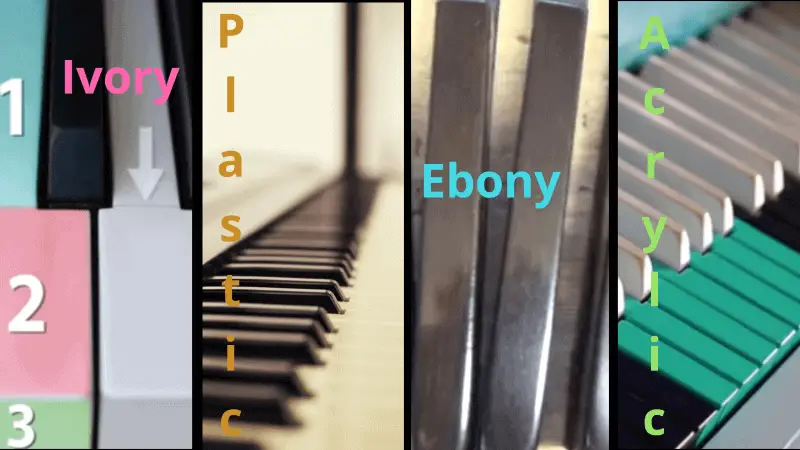Learn how to clean piano keys [both Ivory and Plastic] safely in a step-by-step process, different types of piano keys, tips and tricks, and much more!
If you are a pianist, nothing can be more frustrating for you than seeing your piano keys covered with dust. If you are away from your piano for a long or just using it for a year without cleaning the keys, it will look dirty. Dirt, dust, and oils from your skin damage the brightness of the piano keys.
However, there is no alternative to proper care and maintenance to keep your piano keys shiny and bright like new ones for years. But, is it really easy to clean the piano keys? Not so much if you do not know how to do it. In case you start cleaning the keys without knowing the right way to clean them, you might end up damaging them instead.
So, to help clean your piano keys easily, we have come up with this guide on how to clean Piano keys safely. In this article, we will explore the types of piano keys, how to clean them, and what not to do while cleaning the piano keys.
We will also try to share some tips and tricks on how to take care of the keys. Let’s go ahead.
Why Should I Clean My Piano?
Pianos are beautiful musical instruments that can last for generations with the proper care. Part of taking care of a piano is keeping it clean, both inside and out. Why is it important to clean a piano, though?
There are several reasons to keep a piano clean. First, it helps the instrument look its best. A clean piano is a beautiful piece of furniture that can enhance the look of any room. Second, it helps the piano last longer. Regular cleaning and maintenance can prevent damage to the finish and other parts of the piano, making it last for decades.
Third, cleaning your piano can improve its sound quality. Dust and dirt can build up on the strings and other parts of the piano, causing the instrument to sound dull. Regular cleaning can help keep the piano sounding its best.
Finally, cleaning your piano is an important part of taking care of your investment. A well-maintained piano can hold its value for many years, so it’s important to do everything you can to keep it in good condition.
Cleaning a piano is not difficult, but it does require some special care. Be sure to use the right cleaners and cleaning techniques to avoid damaging the finish or other parts of the piano. With a little time and effort, you can keep your piano looking and sounding great for many years to come.
Which Parts Of The Piano Should I Clean?
Piano care is important to keep your piano looking and sounding its best as you know by now. While you may not need to clean the inside of your piano, there are a few parts of the piano that you should regularly clean.
The keys on your piano can attract dust and dirt easily, so it’s important to give them a good cleaning every so often. You can use a soft, damp cloth to wipe down the keys and remove any build-up. Be sure to avoid using any harsh cleaners or abrasives, as this can damage the keys.
The exterior of your piano is also susceptible to dirt and dust. You can use a slightly damp cloth to wipe down the surface of your piano, being careful not to get the wood too wet. If your piano has any ornate details, you may need to use a soft-bristled brush to reach into crevices and clean them out.
The pedals on your piano can also collect dust and dirt over time. Again, you can use a slightly damp cloth to wipe them down. Be sure to dry the pedals off afterward to avoid any water damage.
As per your query, in this article, I will talk specifically about cleaning the piano keys. But, first, let’s learn about different types of piano keys.
Different Types of Piano Keys

The first step to cleaning the piano keys without damaging them is to know what type of keys your piano comes with. When you know the information about your piano key’s material, you can easily clean them at home or with the help of a professional. Piano keys are usually made of one or more of the four materials as follows:
Ivory Keys
Ivory keys are made from the teeth and tusks of the elephants and other animals like that. This material looks shiny and feels hard. However, when it comes to color, they are off-white. Each ivory key is combined with two parts that you can easily differentiate from each other. When the ivory keys get dirty, they look yellowish. Though you can whiten ivory keys, this is a challenging task to do.
Ebony Keys
When it comes to making black piano keys, ebony is widely used. Ebony is hard. Being made from tropical wood ebony keys are dark in color.
Cellulose Keys
Cellulose Keys can also be named imitation ivory. These keys are made up of organic plastic.
Acrylic Keys
Acrylic keys are also very common in the modern piano.
Here’s an Expert Recommended Piano Keytops Complete Set you can look at for your replacement needs.
Characteristics of Different Piano Keys

Though keyboards are made of plastic and piano with ivory keys most of the time, the condition is changing. As ivory is getting rare day by day, many pianos are using plastic keys instead of ivory keys in the piano. Plastic keys are smoother than ivory keys as they come with a clear coating over them. On the other hand, plastic keys do not feature grain as ivory keys do.
In the beginning, ivory keys were used widely for piano keys. However, when it started to become rare, cellulose and plastic keys started to replace them. From the 1930s, plastic keys and cellulose keys started to become popular and continued to be more popular when many countries declared the use of ivory in the piano illegal.
However, if you have got an age-old piano with a thin seam running horizontally at the narrowing point of the key, you’ve probably got a piano with ivory keys.
Pianos with ivory keys are considered classic and are usually quite costly when compared with the cost of a piano with plastic keys.
However, Piano keys are usually categorized as being either made of ivory or plastic.
It is important to know about the materials of your piano keys because the cleaning process will differ based on the material. If you do not know about the material used in your piano keys, you might end up damaging your piano keys when your intention is just to clean the keys.
Now that you know about different kinds of Piano keys along with the special characteristics and features they come with let’s see how you can clean both the ivory and plastic keys.
How To Clean Piano Keys? (At A Glance)
It is important to clean your piano keys on a regular basis in order to keep them looking their best. Here are a few tips on how to clean piano keys:
1. Use a soft, dry cloth to dust the keys.
2. If there are any stubborn marks or dirt, use a slightly dampened cloth to wipe them away. Be sure to dry the keys immediately afterward.
3. Never use harsh chemicals or abrasive cleaners on piano keys, as this can damage them.
Following these simple tips will help keep your piano keys looking shiny and new! Now, let’s learn how to clean specific types of piano keys.
How to Clean Plastic Piano Keys [Step by Step]

- First of all, prepare the necessary liquid to clean the plastic piano keys. Take a bowl of warm water. Add a few drops of mild dish soap to the water.
- Soak a clean piece of microfiber cloth in hot water and soap solution. Make sure that the cloth you have taken is white.
- However, bring out the cloth after dipping that in the liquid for a few seconds. Get rid of any extra water from the cloth by twisting it. You have to ensure that the cloth is not so wet that water from the cloth enters between the keys and damages them forever. So, using just a damp cloth is ideal for cleaning the piano keys.
- Now, start cleaning the piano with the white keys in a brushing motion. Do not rub the cloth abruptly or press hard on the keys. Be gentle while you clean the keys one by one. While you stroke the keys with the cloth in a brushing motion, make sure that you clean the keys following the back-to-front method and not a side-to-side method. If you adopt the side-to-side bruising method, there is a possibility of moisture and dirt getting transformed between the keys. Also, make sure that you are not wiping the keys from backward.
- When it comes to cleaning the black keys, take another microfiber polishing cloth and stroke gently by going from back to front.
- Once you have cleaned both the white and black keys with two different clothes, take another dry cloth to wipe off the moisture on the keys or any soap residue.
- When you have completely dried up the piano keys, cover them so that no dust can damage them.
